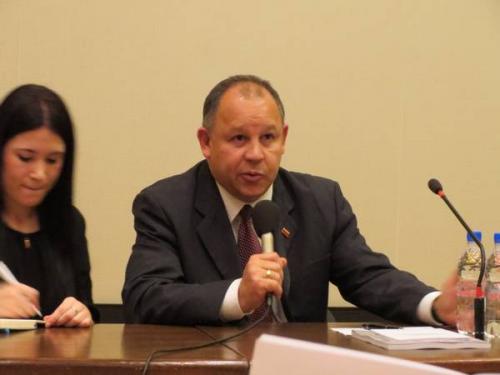The Problems of Informational and Psychological Warfare
- Opinión

On the 3rd of November, the Russian Academy of Sciences hosted the participants of the round table discussion on the problems of informational and psychological warfare in the BRICS countries. The discussion united specialists from Russia and Sweden in this sphere and diplomats. Extraordinary and Plenipotentiary Ambassador of Venezuela, Juan Vicente Paredes Torrealba, opened the meeting with his speech with an accent on the vivid examples of the informational warfare of the USA in Venezuela and called for partnership with Russia in the fight against the informational misbalance. Counsellor Hoglys Jesús Martínez Núñez stated the increase in the number and intensity of informational and psychological attacks against Latin American countries.
The head of the International Centre of Social and Political Studies and Consulting (ICSPSC), DSc. Prof. Evgeny Pashentsev, devoted his speech to the problem of advanced technologies in the sphere of strategic communication and the new threats and opportunities for the BRICS countries. The researcher illustrated the examples of forecasting social unrest with the help of big data analyses in the context of Ukraine and Venezuela.
Sergei Buryanov, associate professor of the International Law and Human Rights Chamber at the Moscow City Pedagogical University dwelled upon the communication aspect of the problems of ethnic and confessional security of BRICS.
Marina Kukartseva DSc., professor at the Political Studies and Political Philosophy Chamber at the Diplomatic Academy, contributed to the discussion with the problem of the national identity of the BRICS counties and the specifics of their communication mechanisms. The contributor stressed that there is practically nothing unifying the BRICS countries except economic interests, while the formation of the common informational space can prove to be useful.
The deputy head of the Centre of Euro Atlantic and Defense Studies of the Institute for Strategic Studies, Dmitry Burykh, analyzed cybersecurity threats in Brazil.

Round table discussion on the problems of informational and psychological warfare
Independent researcher Ilya Bronsky presented his findings in the sphere of informational and psychological warfare as a means of destabilizing BRICS countries. The researcher illustrated by different examples the unconventional warfare used by the USA against BRICS.
One of the most important contributions was made by Greg Simons, a senior researcher at the Uppsala Centre of Russian Studies, Uppsala University, on the topic of tangible threats and intangible means. The researcher mentioned the weakness of the reputation of BRICS and suggested several solutions for its enlarging and strengthening.
The Professor of the State Administration and National Security Chamber at the Diplomatic Academy, Ivan Surma, devoted his paper to the detailed analysis of the threats in the cybersecurity system of BRICS, depending much on the world communicational and informational leaders. The researcher also provided his contribution with a set of recommendations.
The researcher of ICSPSC, PhD Olga Polunina dwelled upon the problems of the effectiveness of strategic communication of Russia in Latin America. The contributor mentioned the problem of synchronization of words and deeds in this sphere.
The senior research scientist of the Moscow City Pedagogical University, PhD, Tatyana Shcherbakova, contributed on the problem of net manipulations around BRICS and stressed the role of social nets as the instrument of soft power.
To sum up, it is important to mention that all the contributors highlighted the urgent problems which face BRICS. Firstly, BRICS should have a more distinguished common aim in the long-term perspective, beyond economic interests. Secondly, a wider public in the BRICS countries should participate in organizational affairs. The Russian public as well as the public of other BRICS countries are in need of informational change. We need to learn more about each other’s social, political and cultural life. Thirdly, BRICS countries should not only defend themselves from informational and psychological warfare but also be able to present a symmetrical response in case of the foreign attempts of destabilization of society. And lastly, BRICS countries should provide a perspective model of social development such that is likely to become attractive for other people in the world. It would help distribute the idea more easily.
- Dr. Olga Polunina International Centre for Social and Political Studies and Consulting, Moscow
Del mismo autor
Clasificado en
Comunicación, Guerra y Paz
- Jorge Majfud 29/03/2022
- Sergio Ferrari 21/03/2022
- Sergio Ferrari 21/03/2022
- Vijay Prashad 03/03/2022
- Anish R M 02/02/2022
